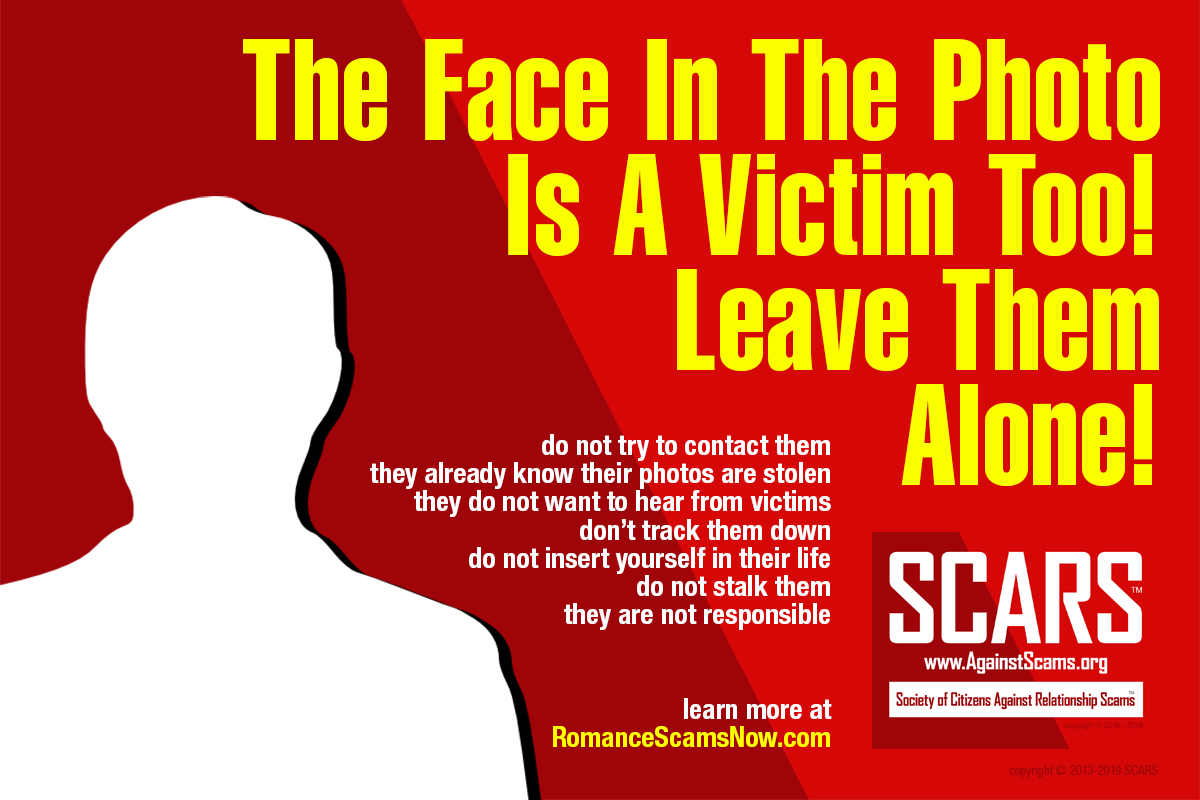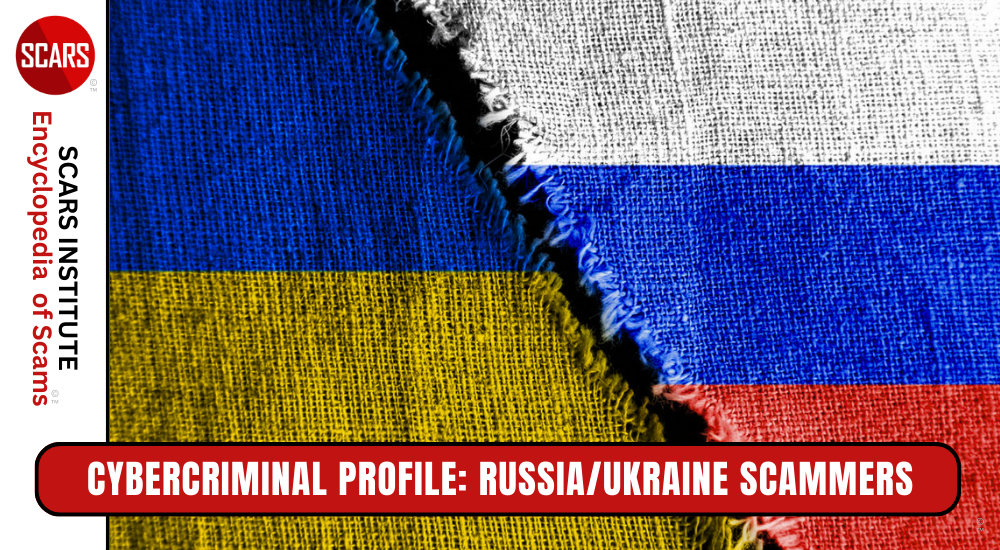
SCARS Institute’s Encyclopedia of Scams™ Published Continuously for 25 Years

Don’t Stalk The Face In The Photo! It’s A Crime
We Are All Sympathetic That Victims Are Scammed!
But Don’t Make It Worse By Breaking The Law Too!
SCARS Basics Series
People Who Have Had Their Photos Stolen Are Victims Too!
They Are Impersonation Victims!
However, it is even more of a problem when the scam victim that fell for those photos hunts down the impersonation victims.
That hunting down is can be a crime too! Called Stalking or Cyberstalking!
In the United States, individuals are classified as victims of stalking or harassment if they experienced at least one of the behaviors listed below on at least two separate occasions.
In addition, the individuals must have feared for their safety or that of a family member as a result of the course of conduct or have experienced additional threatening behaviors that would cause a reasonable person to feel fear.
Often scam victims will contact, threaten, and intrude into the lives of the impersonation victim. Some engage in serious threats, including calling the police on the impersonation victims, harassing their spouses and children, and even showing up at their homes and places of work.
Stalking behaviors by a scam victim include:
- making unwanted phone calls;
- sending unsolicited or unwanted letters or emails;
- following or spying on the victim;
- showing up at places without a legitimate reason;
- waiting at places for the impersonation victim;
- leaving unwanted items, presents, flowers, love letters or emails; or
- posting information or spreading rumors about the victim on the Internet/social media, in a public place, or by word of mouth
We Advise
We advise every scam victim to leave the person alone who appears in the photos. Scam victims do not have a relationship with them since their photos were stolen.
The U.S. Army has asked the United States Department of Justice to investigate stalking, cyberstalking, or harassment behavior of scam victims against active-duty military personnel and veterans whose photos were used in scams.
Never is it acceptable for a scam victim to make someone else’s life miserable, to harass them or stalk them online or in person. Scam victims need to understand that their desire to alert the impersonation victim is driven by something more than concern, and it is not their job to do it. Their job is to notify and report to the police and let them take any action warranted.
Scam victims that cannot accept this situation are putting themselves at risk of going from victim to criminal!
We implore all scam victims to leave the person in the photo alone!
-/ 30 /-
What do you think about this?
Please share your thoughts in a comment below!
LEAVE A COMMENT?
Thank you for your comment. You may receive an email to follow up. We never share your data with marketers.
Recent Comments
On Other Articles
- on Love Bombing And How Romance Scam Victims Are Forced To Feel: “I was love bombed to the point that I would do just about anything for the scammer(s). I was told…” Feb 11, 14:24
- on Dani Daniels (Kira Lee Orsag): Another Scammer’s Favorite: “You provide a valuable service! I wish more people knew about it!” Feb 10, 15:05
- on Danielle Delaunay/Danielle Genevieve – Stolen Identity/Stolen Photos – Impersonation Victim UPDATED 2024: “We highly recommend that you simply turn away form the scam and scammers, and focus on the development of a…” Feb 4, 19:47
- on The Art Of Deception: The Fundamental Principals Of Successful Deceptions – 2024: “I experienced many of the deceptive tactics that romance scammers use. I was told various stories of hardship and why…” Feb 4, 15:27
- on Danielle Delaunay/Danielle Genevieve – Stolen Identity/Stolen Photos – Impersonation Victim UPDATED 2024: “Yes, I’m in that exact situation also. “Danielle” has seriously scammed me for 3 years now. “She” (he) doesn’t know…” Feb 4, 14:58
- on An Essay on Justice and Money Recovery – 2026: “you are so right I accidentally clicked on online justice I signed an agreement for 12k upfront but cd only…” Feb 3, 08:16
- on The SCARS Institute Top 50 Celebrity Impersonation Scams – 2025: “Quora has had visits from scammers pretending to be Keanu Reeves and Paul McCartney in 2025 and 2026.” Jan 27, 17:45
- on Scam Victims Should Limit Their Exposure To Scam News & Scammer Photos: “I used to look at scammers photos all the time; however, I don’t feel the need to do it anymore.…” Jan 26, 23:19
- on After A Scam, No One Can Tell You How You Will React: “This article was very informative, my scams happened 5 years ago; however, l do remember several of those emotions and/or…” Jan 23, 17:17
- on Situational Awareness and How Trauma Makes Scam Victims Less Safe – 2024: “I need to be more observant and I am practicing situational awareness. I’m saving this article to remind me of…” Jan 21, 22:55
ARTICLE META
Important Information for New Scam Victims
- Please visit www.ScamVictimsSupport.org – a SCARS Website for New Scam Victims & Sextortion Victims
- Enroll in FREE SCARS Scam Survivor’s School now at www.SCARSeducation.org
- Please visit www.ScamPsychology.org – to more fully understand the psychological concepts involved in scams and scam victim recovery
If you are looking for local trauma counselors please visit counseling.AgainstScams.org or join SCARS for our counseling/therapy benefit: membership.AgainstScams.org
If you need to speak with someone now, you can dial 988 or find phone numbers for crisis hotlines all around the world here: www.opencounseling.com/suicide-hotlines
A Note About Labeling!
We often use the term ‘scam victim’ in our articles, but this is a convenience to help those searching for information in search engines like Google. It is just a convenience and has no deeper meaning. If you have come through such an experience, YOU are a Survivor! It was not your fault. You are not alone! Axios!
A Question of Trust
At the SCARS Institute, we invite you to do your own research on the topics we speak about and publish, Our team investigates the subject being discussed, especially when it comes to understanding the scam victims-survivors experience. You can do Google searches but in many cases, you will have to wade through scientific papers and studies. However, remember that biases and perspectives matter and influence the outcome. Regardless, we encourage you to explore these topics as thoroughly as you can for your own awareness.
Statement About Victim Blaming
SCARS Institute articles examine different aspects of the scam victim experience, as well as those who may have been secondary victims. This work focuses on understanding victimization through the science of victimology, including common psychological and behavioral responses. The purpose is to help victims and survivors understand why these crimes occurred, reduce shame and self-blame, strengthen recovery programs and victim opportunities, and lower the risk of future victimization.
At times, these discussions may sound uncomfortable, overwhelming, or may be mistaken for blame. They are not. Scam victims are never blamed. Our goal is to explain the mechanisms of deception and the human responses that scammers exploit, and the processes that occur after the scam ends, so victims can better understand what happened to them and why it felt convincing at the time, and what the path looks like going forward.
Articles that address the psychology, neurology, physiology, and other characteristics of scams and the victim experience recognize that all people share cognitive and emotional traits that can be manipulated under the right conditions. These characteristics are not flaws. They are normal human functions that criminals deliberately exploit. Victims typically have little awareness of these mechanisms while a scam is unfolding and a very limited ability to control them. Awareness often comes only after the harm has occurred.
By explaining these processes, these articles help victims make sense of their experiences, understand common post-scam reactions, and identify ways to protect themselves moving forward. This knowledge supports recovery by replacing confusion and self-blame with clarity, context, and self-compassion.
Additional educational material on these topics is available at ScamPsychology.org – ScamsNOW.com and other SCARS Institute websites.
Psychology Disclaimer:
All articles about psychology and the human brain on this website are for information & education only
The information provided in this article is intended for educational and self-help purposes only and should not be construed as a substitute for professional therapy or counseling.
While any self-help techniques outlined herein may be beneficial for scam victims seeking to recover from their experience and move towards recovery, it is important to consult with a qualified mental health professional before initiating any course of action. Each individual’s experience and needs are unique, and what works for one person may not be suitable for another.
Additionally, any approach may not be appropriate for individuals with certain pre-existing mental health conditions or trauma histories. It is advisable to seek guidance from a licensed therapist or counselor who can provide personalized support, guidance, and treatment tailored to your specific needs.
If you are experiencing significant distress or emotional difficulties related to a scam or other traumatic event, please consult your doctor or mental health provider for appropriate care and support.
Also read our SCARS Institute Statement about Professional Care for Scam Victims – click here to go to our ScamsNOW.com website.

















The only thing I did was a reverse-lookup on a couple of the photos shared with me, once I started to suspect I was being scammed. There were no hits and when I looked at the facebook profile more closely, I noticed that ALL photos associated with the fake profile had been uploaded on the same day, even though the captions spanned years. Confirmation to me that the profile was stolen and the captions used to showcase fake photos.
It was a very tough reality for me to accept, but there was the proof.
I appreciate this article as some of the information was not known by me. I did reach out to the celebrity regarding the scam basically because of ignorance. I’ve never been through this before and I mistakenly thought the FBI was going to take more immediate action. I was afraid of the FBI arriving to question the celebrity and the celebrity would be shocked about this. Apparently, issues such as scam impersonators must be something celebrities protect themselves from legally. Not sure. Anyway, I did send a letter to alert the celebrity about the impersonation and to let them know they may need to take legal action. I thought it was the responsible and right thing to do as I felt I brought this trouble to them with my interaction with the imposter.
The pig butchers photos I received from them on Telegram are some of the same photos on their Facebook page. They even confirmed that it was their Facebook page (which also must be fake). I wish law enforcement would track down who is updating that Facebook page.
The Facebook pages rarely lead to a real person. However, once a criminal has been identified, then the profiles provide valuable evidence, as long as a vigilante does not have it deleted first.